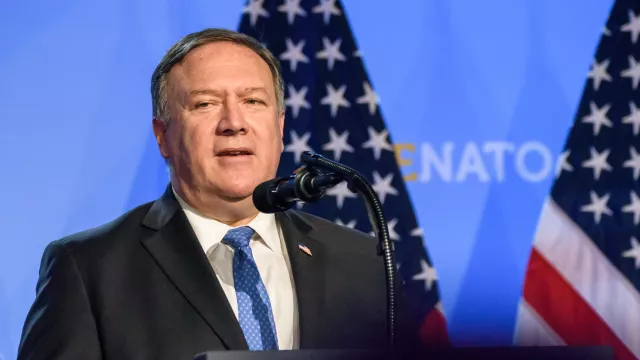Table of Contents
Questions remain after MIT asserts it canceled Pompeo’s speech due to COVID-19 restrictions

Lev Radin / Shutterstock.com
Former U.S. Secretary of State Mike Pompeo speaks to the press after a United Nations Security Council meeting on nuclear non-proliferation at UN Headquarters in 2018. Pompeo alleges in his new memoir that MIT cancelled a speech he was scheduled to give in 2020.
Last week, FIRE wrote MIT President Sally Kornbluth in light of former Secretary of State Mike Pompeo’s allegations that the university canceled his campus speech in 2020 to avoid “offending” students from China.
FIRE is awaiting an official response to our letter. In the meantime, the university posted a statement on Twitter addressing the allegations. MIT asserts that its then-effective COVID-19 restrictions limiting the size of events and the presence of guests necessitated the decision. Calling 2020 a “unique time,” MIT said “high-level visits could draw significant numbers and convey to students that MIT was not taking its health policies seriously.”
“MIT turned away a number of prospective visitors in keeping with the policies we had in place for the health of our students and community,” MIT said in the statement. “We were consistent in the approach.”
Pandemic-related rules can be a valid justification for rejecting a speaking request: At the time, universities across the country regularly enforced limits on indoor, in-person events and functions. Local and state governments and federal policies enacted many similar restrictions as well. However, in line with First Amendment requirements or, in MIT’s case, institutional free speech commitments, such restrictions must apply in a viewpoint-neutral manner, meaning evenly across the board based on objective standards and not as an excuse to limit unpopular speech.
As FIRE wrote in September 2020, “Colleges and universities cannot justify restrictions on the viewpoints advanced in student and faculty expression protected by the First Amendment (at public institutions) or by institutional policies and promises (at private institutions) because of COVID-19 or public health or safety concerns. There is no coronavirus exception to the First Amendment’s general requirement of viewpoint neutrality.”
According to MIT’s statement, the university was “consistent in the approach” of applying pandemic-related restrictions across all events and speakers. FIRE is glad to see this commitment to viewpoint-neutrality in university policy, but we hope the university’s response to our letter will address the factual discrepancies between Pompeo’s allegations and the university’s rebuttal.
Pompeo asserts that the university confirmed it would host the event and went so far as to agree on a date for it, but then backtracked, with former President L. Rafael Reif specifically citing “the risk of offending his Chinese students.”
MIT should clarify whether the event was planned, despite campus COVID-19 restrictions, or if it was never scheduled at all. Further, it should clarify whether its president indeed cited Pompeo’s opinions as the impetus for the cancellation, rather than a viewpoint-neutral policy governing in-person events.
FIRE remains ready to assist President Kornbluth in promoting free expression at MIT, and looks forward to continuing this conversation with MIT’s leadership. We hope the university’s response to our letter will clarify these remaining questions.
FIRE defends the rights of students and faculty members — no matter their views — at public and private universities and colleges in the United States. If you are a student or a faculty member facing investigation or punishment for your speech, submit your case to FIRE today. If you’re a faculty member at a public college or university, call the Faculty Legal Defense Fund 24-hour hotline at 254-500-FLDF (3533). If you’re a college journalist facing censorship or a media law question, call the Student Press Freedom Initiative 24-hour hotline at 717-734-SPFI (7734).
Recent Articles
FIRE’s award-winning Newsdesk covers the free speech news you need to stay informed.

AI is new — the laws that govern it don’t have to be

Defending free speech: FIRE and Substack partner to protect writers in America

Brown University targets student journalist for sending DOGE-like emails



